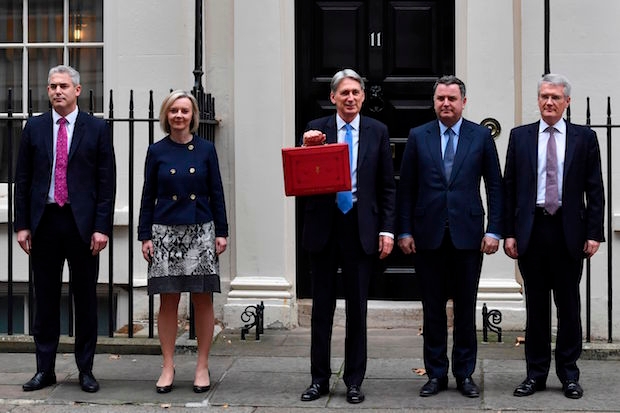Cabinet ministers toddled up Downing Street this morning in a largely good mood. Most of them were relieved that last week’s Conservative conference hadn’t been the catastrophe that everyone had expected, and many were even happier that the conference had closed with Theresa May declaring that austerity is over. Of course, one of their number will be feeling rather less comfortable with that: Philip Hammond will now have to sift through even more bids from his ministerial colleagues for more funding, now that they believe they could be in line for the dividends of the end of austerity.
The Chancellor now needs to work out a way of fobbing off those colleagues – and then justifying this to the Commons when he makes his Budget statement at the end of this month. It’s much harder than it was in the days of David Cameron and George Osborne, though. Back then, the Conservatives couldn’t stop talking about the deficit, whereas that narrative has largely been abandoned by the May government. It’s also been a long time since the last Labour government, which means it would be ineffectual for Hammond to say that he can’t turn the taps on now as he’s clearing up the mess that Labour left.
So who to blame? I understand that the Treasury has been testing some lines with Tory MPs ahead of the Budget, and one of them is about companies that avoid paying sufficient levels of tax. A line about tech companies in particular was sent out in a WhatsApp group recently – but it received a mixed response from backbenchers who weren’t sure that bashing business even more would really be a good look for the Conservatives, even if it did involve having a go at a sector that attracts a fair bit of negative press. There have been reports that the Chancellor is considering a new digital tax to cover these companies, but it’s not clear whether he’s going to use them as an excuse for the straitened times continuing.
One thing is clear, though: if your department isn’t very politically salient, you’re unlikely to get much of a hearing from the Treasury, anyway. Some of the least salient departments, such as Ministry of Justice, also just happen to be the ones that are struggling the most as a result of the past few years of cuts. But one minister recently pointed out to me, somewhat dolefully, that ‘there are no votes in justice’, and so the things that voters are much angrier about will get more attention – and therefore any of the extra money that Hammond does feel he has to hand over.







Comments